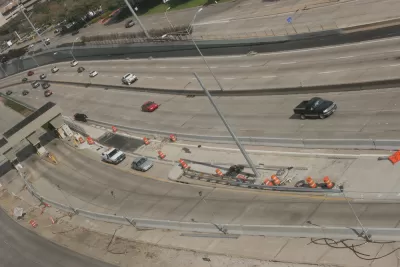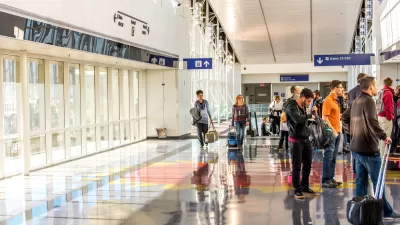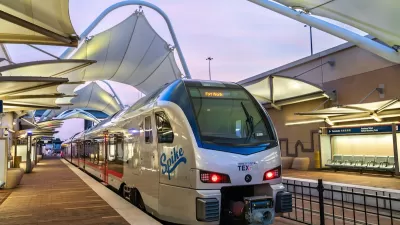At the helm of a movement to think beyond concrete solutions to transportation challenges in North Texas are the mayors of Fort Worth, Grapevine, and Arlington.

Unexpected words attacking congestion were uttered by prominent members of the Tarrant Regional Transportation Coalition at their August 2 meeting. One might have thought they were attending a Sierra Club transportation committee gathering and not a meeting of civic leaders of Tarrant County, the third most populous in the Lone Star state. Fortunately, Tim Ciesco from NBC Dallas Fort Worth was there to report (also by newscast video) on the new approaches promoted by elected leaders in North Texas.
"We can't keep building highways," said Grapevine Mayor William D Tate. "They're too expensive. It costs millions of dollars to build an overpass. And [to acquire] the right of way, you keep having to tear down businesses."
"We really have to think about the region as a system," Fort Worth Mayor Betsy Price said. "How do we connect people? How do we make it easier for them to get around — whether it's trains, whether it's buses, whether it's cars? But like we've said, you're never going to pour enough concrete to accommodate that."
Part of the new thinking stems from next year's opening of TEXRail, which "Price and Tate both touted as a game changer for their cities," adds Ciesco. The diesel multiple unit trains (similar to the SMART train in Marin and Sonoma counties in California that did a 'soft launch' in June) will operate on 27 miles of existing tracks, connecting downtown Fort Worth to DFW International Airport.
The project secured $500 million in federal funding last December. Planning was finalized on June 30, 2016 and broke ground in August. DFW has been serviced by DART light rail since August 2014.
Mayors Price and Tate expressed high hopes for what they also refer to as "The T" train:
"Boy, this is like man landing on the moon," Tate said. "This is a giant leap for mankind, to tie DART and The T together and to be able to ride all day on either system on one ticket."
"I think it's the first stake in the ground that says we're serious about mass transit," Price said. "This leg from the [Fort Worth] Intermodal Center to D/FW Airport will be that first symbol that we really want to do this. The ridership, we expect to be really big — bigger even than we thought it might be. And once you have that investment and that equity built in that piece, that gives you the ability to go back to your citizens, to Austin, and to your friends in Washington and say look how successful this is. Now, we need to expand it."
Arlington Mayor Jeff Williams touted solutions coming from technology which will be put to work in his city of almost 400,000 people 12 miles east of Fort Worth.
Williams said later this month, driver-less shuttles will begin operating in the city's Entertainment District, transporting visitors between parking lots and Globe Life Park, as well as Six Flags Over Texas.
"I tell you what, when I got in one and there was no steering wheel and no brake, it was a little nerve-racking," Williams said. "But it worked. It's phenomenal when you think about that technology is here. It will be the first test of an autonomous people mover for the public." [Actually Las Vegas beat them to it, but don't tell the mayor].
Hat to AASHTO Daily Transportation Update.
FULL STORY: "We Can't Keep Building Highways": North Texas Mayors Call for More Innovation in Transportation

Maui's Vacation Rental Debate Turns Ugly
Verbal attacks, misinformation campaigns and fistfights plague a high-stakes debate to convert thousands of vacation rentals into long-term housing.

Planetizen Federal Action Tracker
A weekly monitor of how Trump’s orders and actions are impacting planners and planning in America.

In Urban Planning, AI Prompting Could be the New Design Thinking
Creativity has long been key to great urban design. What if we see AI as our new creative partner?

California Creates Housing-Focused Agency
Previously, the state’s housing and homelessness programs fell under a grabbag department that also regulates the alcohol industry, car mechanics, and horse racing.

Chicago’s Ghost Rails
Just beneath the surface of the modern city lie the remnants of its expansive early 20th-century streetcar system.

Baker Creek Pavilion: Blending Nature and Architecture in Knoxville
Knoxville’s urban wilderness planning initiative unveils the "Baker Creek Pavilion" to increase the city's access to green spaces.
Urban Design for Planners 1: Software Tools
This six-course series explores essential urban design concepts using open source software and equips planners with the tools they need to participate fully in the urban design process.
Planning for Universal Design
Learn the tools for implementing Universal Design in planning regulations.
planning NEXT
Appalachian Highlands Housing Partners
Mpact (founded as Rail~Volution)
City of Camden Redevelopment Agency
City of Astoria
City of Portland
City of Laramie




























